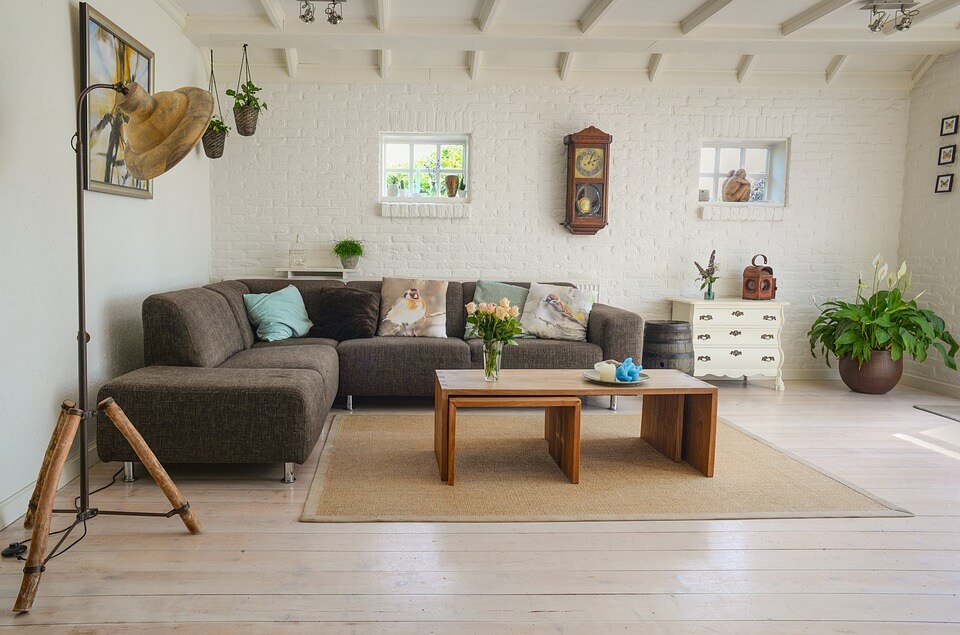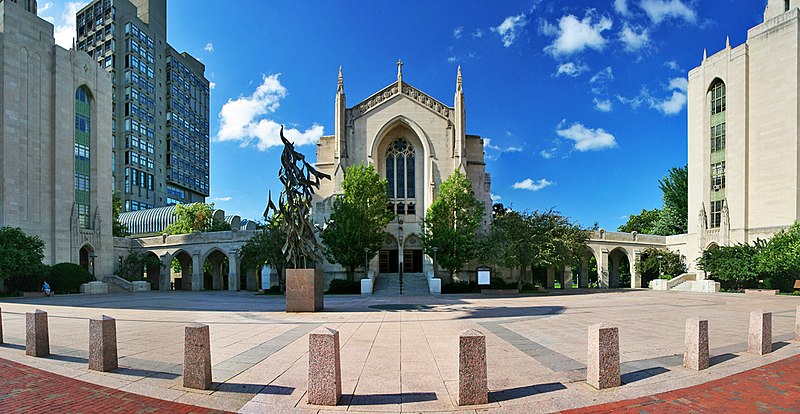How to find accommodation in Germany can be a challenge, especially for expats and international students, with rental competition intensifying during peak seasons like the start of the academic year. Navigating factors such as location (Koordinate), rental price (Preis), and safety (Umweltsicherheit) is crucial, as rushing into a rental agreement without proper research can lead to costly mistakes. This guide provides essential tips on how to successfully find housing in Germany, including where to search, how to apply, and key German rental terms, helping you approach the process with confidence.
Part 1. Types of Accommodation in Germany
Before you start to find accommodation in Germany, think about what type of room you prefer. Generally speaking, types of housing in Germany are mainly divided into single rooms/private apartments (Einzelapartment/zimmer) and shared apartments (Wohngemeinschaft, WG). If you’re a student, you can choose on-campus student residences, or off-campus student accommodation in Germany.
1️⃣ Student Accommodation (Studentenwohnheim)
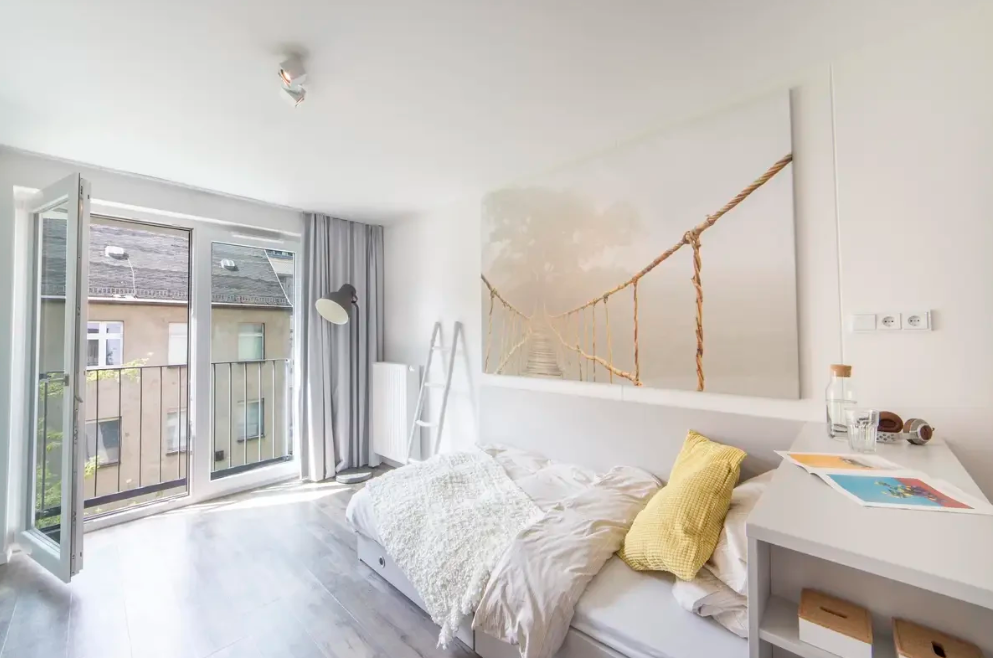
Purpose-built Student accommodation is the first choice for many students. Here are its advantages:
- Usually located within short walking distance of universities.
- Rooms are fully furnished, including wardrobes (Kleiderschrank), beds (Bett), desks (Schreibtisch), and bookcases (Bücherschrank).
3. The money you pay is mostly an “All-in Price“. Utilities bills such as electricity, water, heating, and internet, are covered by your rent. Various room types are available to cater to different preferences and budget plans.
🛌🏼 Some student apartments are shared by 2-4 residents, with a shared bathroom and a shared kitchen. Some are single rooms or studio apartments, with private bathrooms and private kitchens. The average rent is much lower than the normal cost of renting a house. The supply is limited and very popular, so you’d better book your room several months in advance.
If you’re looking for student accommodation in Berlin, we recommend THE FIZZ Berlin, a well-designed accommodation provider. It offers comfortable living rooms and excellent communal spaces.
2️⃣ Private Accommodation (Einzelwohnung)
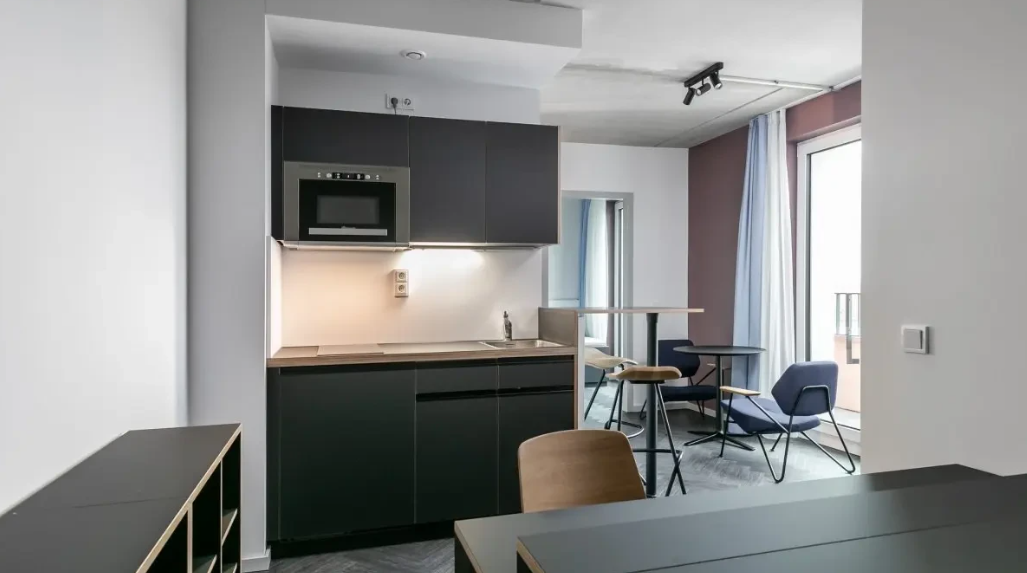
Social apartments and private houses for rent in Germany are also great options. The private accommodation includes single flats, single rooms, studio apartments, and 1-bedroom apartments (Einzimmerwohnung).
Single apartments provide better private space and independence compared to shared accommodation. It’s ideal for individual tenants or couples, and also more expensive than shared accommodation. Here are some recommended apartments for rent that are comfortable and affordable: Village M. Charlottenburg, Village M. Wedding, 66 Monkeys Mühlenstraße.
3️⃣ Shared Accommodation (Wohngemeinschaft or WG)
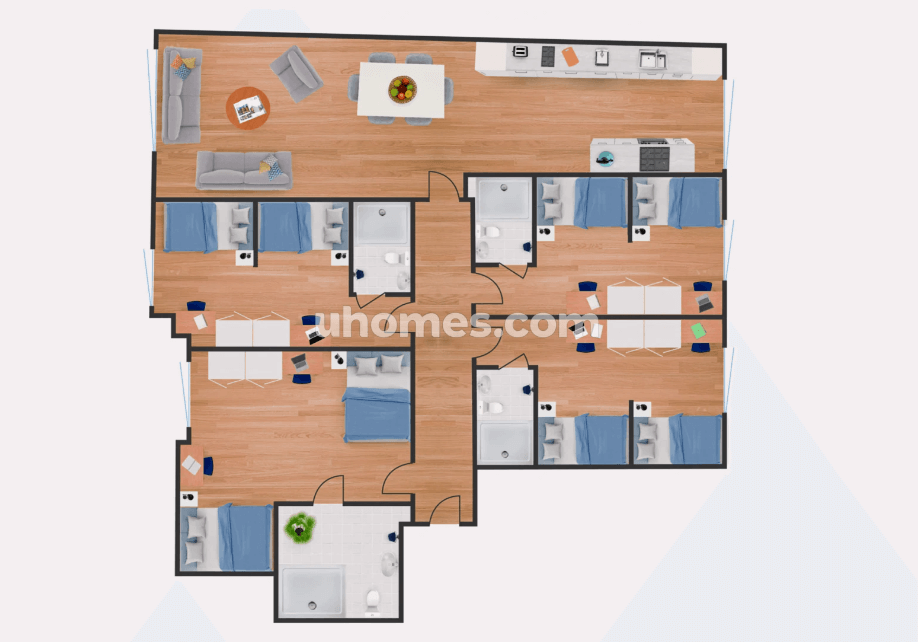
A floorplan as an example
The shared accommodation, or in German “Wohngemeinschaft” (WG), is another popular choice for students or young professionals. A shared room typically refers to an individual space in a larger house or apartment for relaxing and working/studying. They have shared bedrooms (in some cases), shared kitchenette, and shared living spaces.
This option can be more budget-friendly. If you like to socialize, this is a good opportunity to make new friends. uhomes.com provides the service to find roommates for you according to your requirements.
💡 Tips: Altbau (Old Building) vs. Neubau (New Building)
In some information about apartments for rent in Germany, you may find the words “Altbau” and “Neubau“. You can choose according to your budget, location preference, style preference, and some other factors.
- “Altbau” means “old building”. It mainly refers to buildings that were built before World War II. These apartments in Germany are known for their character, with high ceilings, wooden floors, and historic details. Although with charming outlooking, they can be more expensive to heat and require more maintenance.
- “Neubau” means “new building”. On the other hand, Neubau are modern buildings constructed after World War II. They may be located in newly developed areas of cities or integrated into older neighborhoods with upgraded infrastructure. They often feature contemporary designs, energy-friendly systems, and modern amenities. Neubau apartments are often easier to maintain and may offer additional facilities and amenities like elevators and underground parking.
Part 2. How to Find Accommodation in Germany
1️⃣ Short-term Accommodation in Germany
There are situations in which you may need to find short-term accommodation in Germany, such as for a summer camp or a vacation. If you are planning to live in Germany for a long time, it is a good idea to start with short-term accommodation when you first arrive in Germany. Below are some of its advantages:
1. Anmeldung is usually allowed
Anmeldung can be the most important precondition for smoothly living in Germany. Luckily, most options for short-term accommodation in Germany allow Anmeldung. But you should still carefully check this before paying.
2. Furnished apartments
Rooms for short-term accommodation in Germany are usually furnished. You don’t have to spend a lot of money or time to get the necessary furniture. Just bring your baggage, step into your apartment, and then start your life in Germany!
3. Flexibility for knowing a new city
For those who come to Germany for the first time, it takes some time to know the new city. Which area is more comfortable for a living? Is that apartment closer to transportation lines or my university? Which neighborhood is safer to live in? Living in short-term accommodation in Germany, you’ll have the flexibility to explore different places.
4. Fast booking without much paperwork
Booking short-term accommodation doesn’t require as much paperwork as booking long-term accommodation. You can reserve and secure your room online.
2️⃣ How to Find Short-term Accommodation in Germany
Finding accommodation in Germany from a distant ocean has a certain amount of risk. So you need a reliable and trustworthy partner to help you complete this task. Here we recommend uhomes.com, a powerful rental portal to work with you and confirm the best accommodation in Germany. You can conveniently and quickly find accommodation in Germany by the following steps:
Step 1: Choose the country and city you’re moving in. Or just enter in the search box.
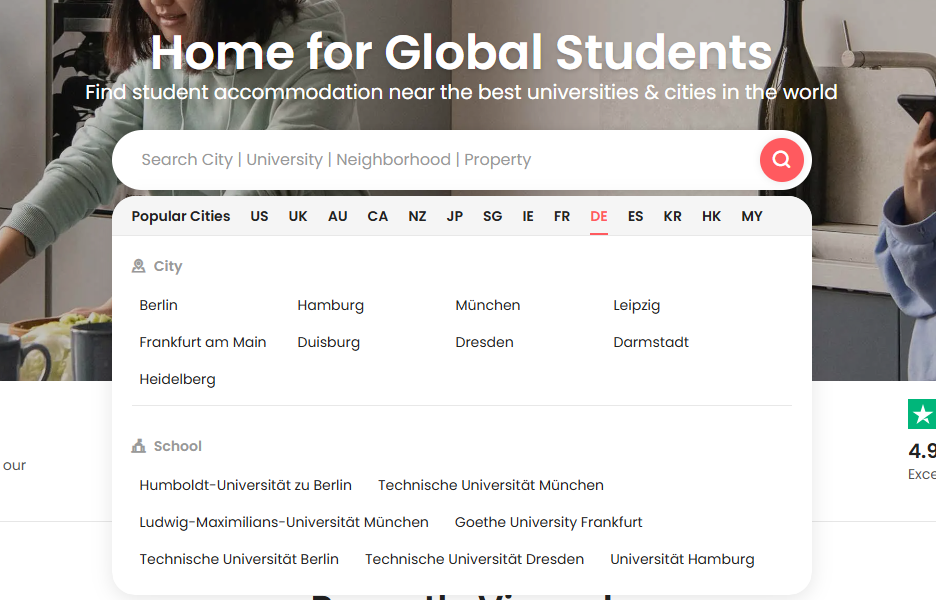
Step 2: Filter the property lists according to your preference. You can select “Flexibility” under “Duration“, or click “More“, and then choose “Short lease” under “Service Features“.
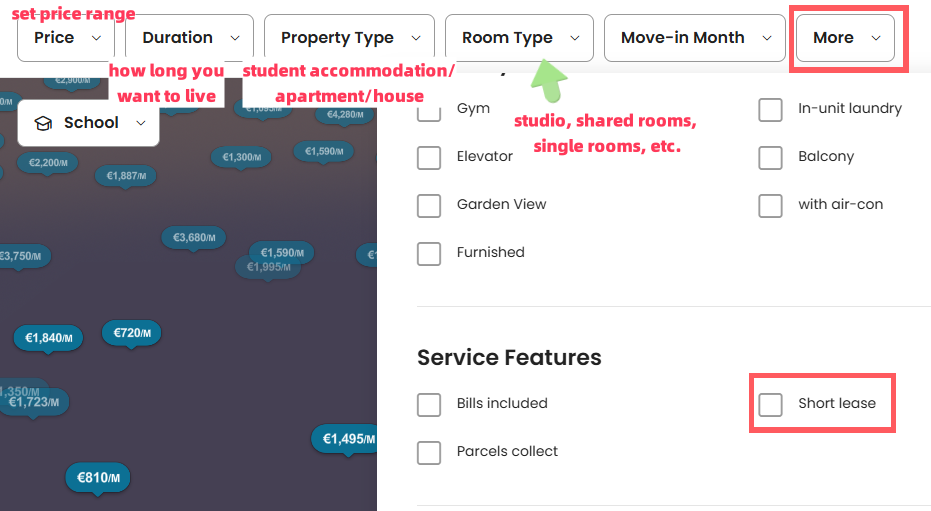
1. Official Websites of Housing Providers
Many apartment chains have their own official websites. You can find detailed information about accommodation types, prices, locations, and facilities on the web pages. If you have any questions, you can directly contact them and know if the housing in Germany fits your needs.
For students looking for student accommodation in Germany, the official websites of their universities are very useful, including on-campus halls and off-campus flats. They can also provide advice and assistance on accommodation options.
2. Online Real Estate Website
Visit major online housing websites such as uhomes.com. These websites offer options for apartments for rent in Germany, and users can filter them by location, price, room type, lease type (long-term or short-term), etc.
These websites usually allow tenants to customize their search criteria to find the apartment that best meets their needs. Additionally, tenants can view photos, videos, and reviews of the apartments to better understand the actual conditions of the houses for rent. Here we take uhomes.com as an example:
- Step 1: Browse the list and select the property you are interested in. Some basic information is displayed.
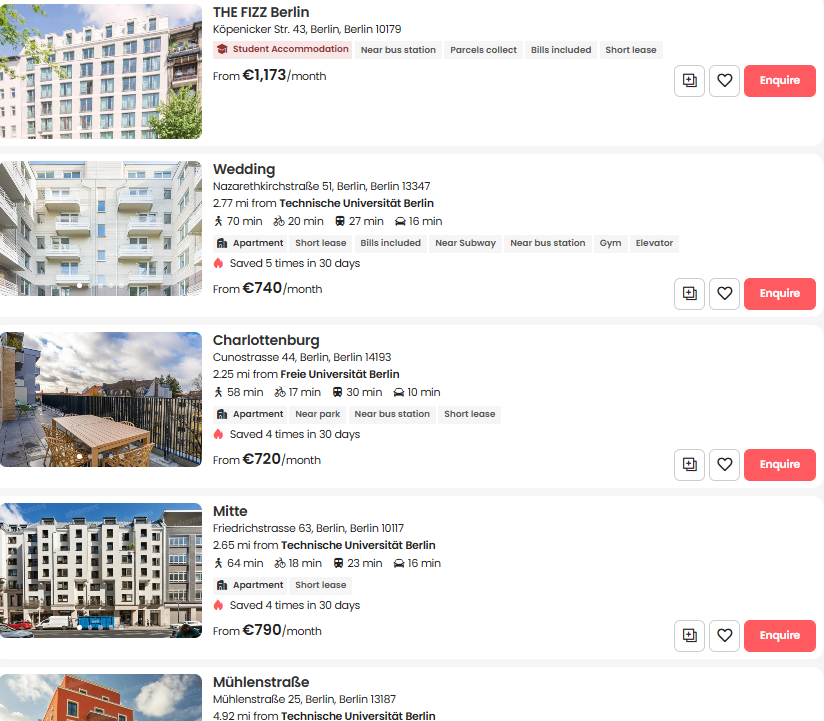
- Step 2: Click to go to the property details page and browse the room details you want to see. One of the professional consultants will help you find the best accommodation in Germany.
For example, the following picture shows an apartment in Nazarethkirchstraße. You can check the photos in and out of the apartment, community amenities, floor plan of rooms, fees, and more.
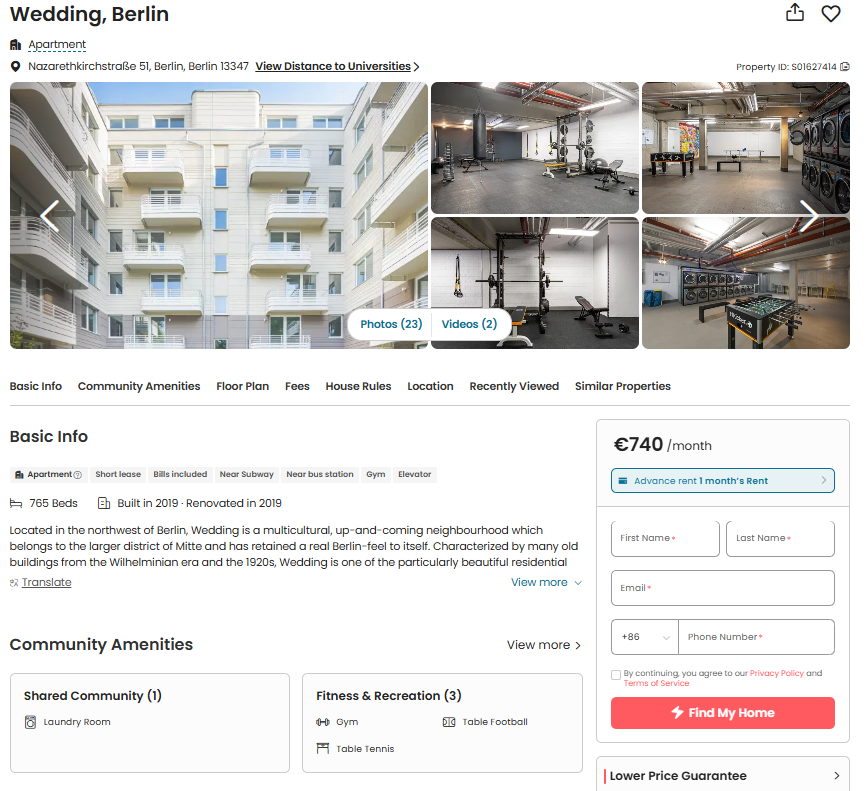
3. Social Media and Forums
Renting a house in Germany based on experiences, advice, and word of mouth is also a good option. At least it can help you avoid renting a bad house to a large extent.
When someone is about to move out of the apartment, they usually recommend their friends or acquaintances to the landlord. Or they will post advertisements for subletting houses on social software and public platforms. In this way, the landlord does not have to worry about the house being vacant because of the search for new tenants, and you can also move into a satisfactory house faster and more conveniently.
Part 3. Before Moving in Accommodation in Germany
1️⃣ What Documents Do I Need to Rent an Apartment in Germany?
When you find a satisfactory house or apartment for rent in Germany, the next step is to sign a rental contract. Then what documents should you prepare? Let’s check the list.
- Copy of Passport/ID (Personalausweiskopie): A valid national ID card (German citizens) or a passport (foreigners). If you’re a student, you also need to provide a student certificate.
- Proof of Income (Einkommensnachweise): This could be your bank statement, pay slip or professional tax certificate. If you have no income, you can provide proof of income from your sponsor.
- Credit Record Documentation (Schufa Credit Report): Landlords usually ask tenants to provide a credit score report to prove their creditworthiness. This score can be obtained from the German credit scoring agency. A credit history document, also known as a Schufa Selbstauskunft or Schufa Record, is a document that records the trajectory of your debt.
- References/Previous Rental: If possible, a letter of recommendation from your former landlord will prove that you are a good tenant. This can increase your credibility. Especially when the rental market is competitive, this may increase your chances of getting a rental.
2️⃣ Complete Your Anmeldung
Anmeldung (“An”) is a legal prerequisite for residence in Germany. Legally, if you plan to live in Germany for more than 3 months, you must complete the Anmeldung within 2 weeks of moving to a new address in Germany. For new students, they also need to provide an Anmeldung form issued by the city hall to prove that they have a fixed address. When you register, you will need a certificate from the landlord.The main steps to complete the registration are as follows:
- Reserve accommodation in the German city that allows Anmeldung
- Prepare paperwork for your Anmeldung: including a Wohnungsgeberbestätigung form, An Anmeldung form, your passport, etc.
- Make an appointment for Anmeldung.
- Attend your appointment.
Part 4. Rental Terms & Vocabularies & Abbreviations in Germany
When you find accommodation in Germany and select information for your housing, you will see many German terms, vocabulary, definitions, or abbreviations that you don’t understand. One of the most important terms you should know is the “Kaltmiete” und “Warmmiete”:
- Cold Rent (Kaltmiete): It means that the rent does not include any additional costs, such as water, electricity, heating, etc. You need to know exactly how much the cold rent will be each month before signing rental contracts.
- Warm Rent (Warmmiete): The warm rent covers all additional costs, i.e. water, electricity, heating, and waste disposal. The contract should clearly state the amount of the warm rent.
- Additional Costs (Nebenkosten): These are the additional expenses on top of the cold rent, including heating costs, water costs, property management fees, etc. You need to confirm which costs are already included in the warm rent and which costs need to be paid extra.
Here, we summarize a listing of some other common rental terms.
| German | English | Abbreviation |
|---|---|---|
| Wintersemester | Winter Semester | WS |
| Sommersemester | Summer Semester | SS |
| Hauptbahnhof | Central Railway Station | HBF |
| Universität | University | Uni |
| Kaltmiete | Cold Rent | KM |
| Warmmiete | Warm Rent | WM |
| Nebenkosten | Additional Costs | NK |
| Quadratmeter | Square Meters | QM |
| Altbau | Old Building | AB |
| Neubau | New Building | NB |
| Kaution | Security Deposit | KT |
| möbiliert | Furnished | Möbl. |
| Mietvertrag | Rental Contract | MV |
| Balkon | Balcony | BK |
| Garten | Garden | Gtn. |
| Einbauküche | Built-in Kitchen | EBK |
| Erdgeschoss | Ground Floor | EG |
| Gasheizung | Gas Heating | GH |
| Übergabeprotokoll | Handover Protocol | ÜP |
| Mieterhöhung | Rent Increase | MH |
| Einzugstermin | Move-in Date | EZT |
| Untermiete | Sublet | UM |
| Kündigungsfrist | Noticr Period | KF |
| Wohnfläche | Living Area | WF |
| Wohnberechtigungsschein | Subsidized Housing Permit | WBS |
| Zentralheizung | Central Heating | ZH |
| Etagenheizung | Floor Heating | EH |
| Wohngemeinschaft | Shared Accommodation | WG |
Part 5. Conclusion
When finding accommodation in Germany for the first time, you may have some difficulties and obstacles. Before searching, you need to learn the main types of accommodation in Germany, the price ranges of different types of housing, and the districts and neighborhoods of your city. At the same time, knowing the meaning of German terms is also crucial in the process of collecting information and signing rental contracts.
If you think it is too much trouble, you can just give this work to a rental agency, such as uhomes.com. Our professional consultants will help you do these things so that you can move directly into the reserved apartment in Germany.
Part 6. FAQ
How to find accommodation in Germany?
You can apply for accommodation in Germany through a reliable online rental portal, such as uhomes.com, or you can contact a rental agency and tell them your requirements. Also, renting housing in Germany that your friends or acquaintances once lived in is a good idea.
Is it hard to find accommodation in Germany?
It depends on the location of the houses for rent in Germany. The rental market close to major universities, or in the downtown of big cities, is extremely competitive. The rent is also very high.
What is cold and warm rent in Germany?
The cold rent (Kaltmiete) means that the rent does not include any additional costs, such as water, electricity, heating, etc. It’s only the basic rent. And the warm rent (Warmmiete) covers all additional costs and utility bills, i.e. water, electricity, heating, and waste disposal (sometimes also maintenance fees).
Where is cheaper to rent in Germany?
Many cities with lower cost of living are located in the eastern and northern regions of Germany, such as Bielefeld, Frankfurt, Leipzig, Potsdam, Erfurt, etc.
What are the best websites to find accommodation in Germany?
uhomes.com is the best website to find student accommodation in Germany. Some of the other top websites to find accommodation in Germany include ImmobilienScout24, WG-Gesucht, and eBay Kleinanzeigen. These platforms offer a wide range of listings for apartments, shared flats (Wohngemeinschaften), and student housing, catering to different budgets and preferences.
How much does it cost to rent an apartment in Germany?
Rental prices in Germany can vary widely by city and location. In major cities like Munich, Frankfurt, or Berlin, rent for a one-bedroom apartment in the city center can range from €800 to €1,500 per month, while smaller cities or rural areas may offer more affordable options starting from €400 to €800.
What documents do I need to rent an apartment in Germany?
When renting an apartment in Germany, you’ll typically need a proof of income (Gehaltsnachweis), a SCHUFA credit report, and a rental reference (Mietschuldenfreiheitsbescheinigung) from your previous landlord. International tenants may also need to provide a valid passport or visa, as well as a German bank account for rent payments.




